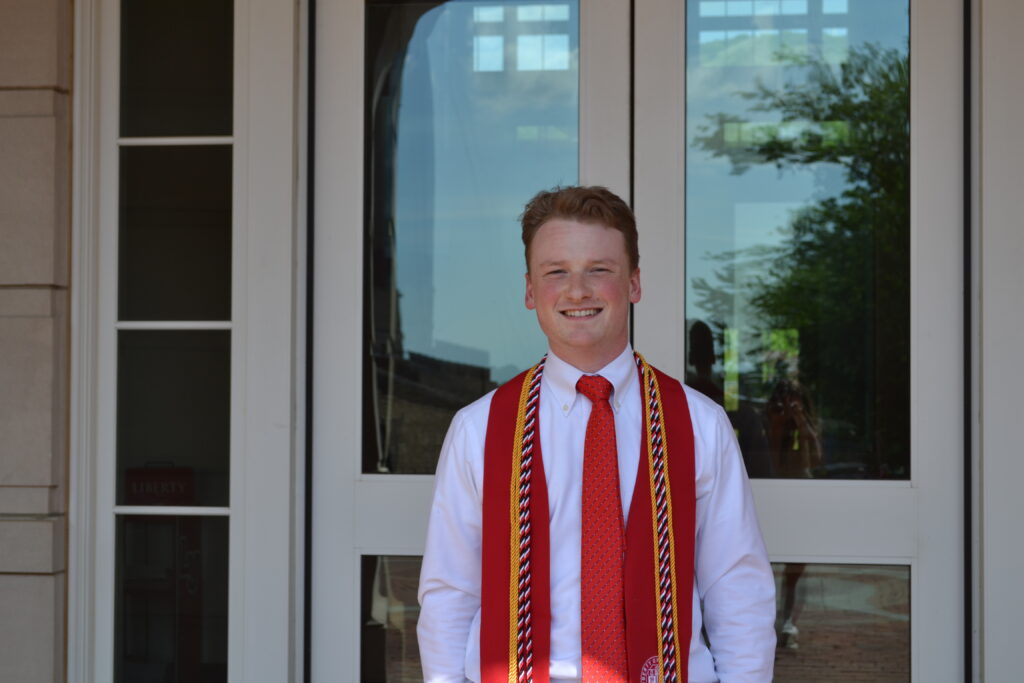We welcomed our newest John Blundell Fellow, Jacob Chace, to our staff in May. Jacob had a running start, beginning the fellowship part-time in December while completing his bachelor’s degree. Jacob will be with us for one year, working as a program assistant, exploring options for future employment or graduate study, and completing a special project. We established the John Blundell Fellowship in 2015 for recent graduates interested in advancing freedom and pursuing a career in public policy, academia, journalism, philanthropy, or public service. Previous fellows have gone on to medical school, military service, public service, and nonprofit work.
We asked Jacob to share more about himself in a brief Q&A.

Question: What is your hometown, and what brought you to North Carolina?
I grew up in Westerly, Rhode Island, and went to high school in Connecticut. During my junior year of college, I worked for a nonprofit in Raleigh. Through the staff there, I was connected with the John Locke Foundation, where I interned during the Fall 2022 semester. I knew I wanted to live in North Carolina sin
ce I began working here. I have met many like-minded people who are proud to be from the state. And the weather sure beats New England. My wife and I moved to Wake Forest following our graduation in May.
Question: Where did you attend college?
After graduating from the Word of Life Bible Institute with a Certificate in Biblical Studies, I decided to attend Liberty University. I knew that I wanted to work in policy, whether that be domestic or foreign affairs, and Liberty afforded me an opportunity to be part of policy discussions throughout college. The vibrant student community was also appealing. The Alexander Hamilton Society and Young Americans for Freedom have highly active chapters on campus. These societies allowed me and my fellow students to interact with experts and have in-depth discussions on the best approaches to U.S. public policy. In May, I graduated from Liberty with a B.S. in Government: Politics and Policy and a minor in Journalism.
Question: What was your favorite college course and why?
At Liberty, the most impactful course on my worldview was Political Economy and Public Policy, taught by Dr. Gai Ferdon. This class focused on applying social ethics and economic theory to government and politics. Dr. Ferdon made a strong case for the role of civil government versus the role of the market, the morality of capitalism, and the problems of special interest groups and public bureaucracies. My deep interest in the intersection between philosophy and economics began with this course. Another important class during my time at Liberty was American Foreign Policy, taught by Dr. Thomas Metallo. Throughout this course, Dr. Metallo traced the development of the United States from the French and Indian War to the Trump Administration with a foreign policy perspective. The course facilitated discussions on Jay’s Treaty, The Monroe Doctrine, and the presidencies of John Adams, James Polk, and Abraham Lincoln by teaching from primary documents. Although I took this course my sophomore year, I still reference its content when studying current affairs.
Question: Of the Pope Foundation’s four giving areas — public policy research, higher education, human services, and the arts — which interests you the most?
Public policy research continues to be the area I find most interesting. I have seen firsthand the importance of civil dialogue when making policy decisions. Since joining the staff of the Pope Foundation, I have gained a better perspective on how the nonprofit world affects policy formulation.
Question: What skills or qualities do you hope you acquire throughout your year in this role?
I entered the Blundell Fellowship role with three specific goals: to better understand the nonprofit space, to identify how nonprofits influence public policy, and to develop my research and journalistic writing skills. Since setting those goals, I have realized that an understanding of political philosophy is also extremely important. I intend to spend time studying classical texts alongside my other responsibilities. I also hope to make North Carolina a better place to live, work and prosper throughout my time with the Pope Foundation.